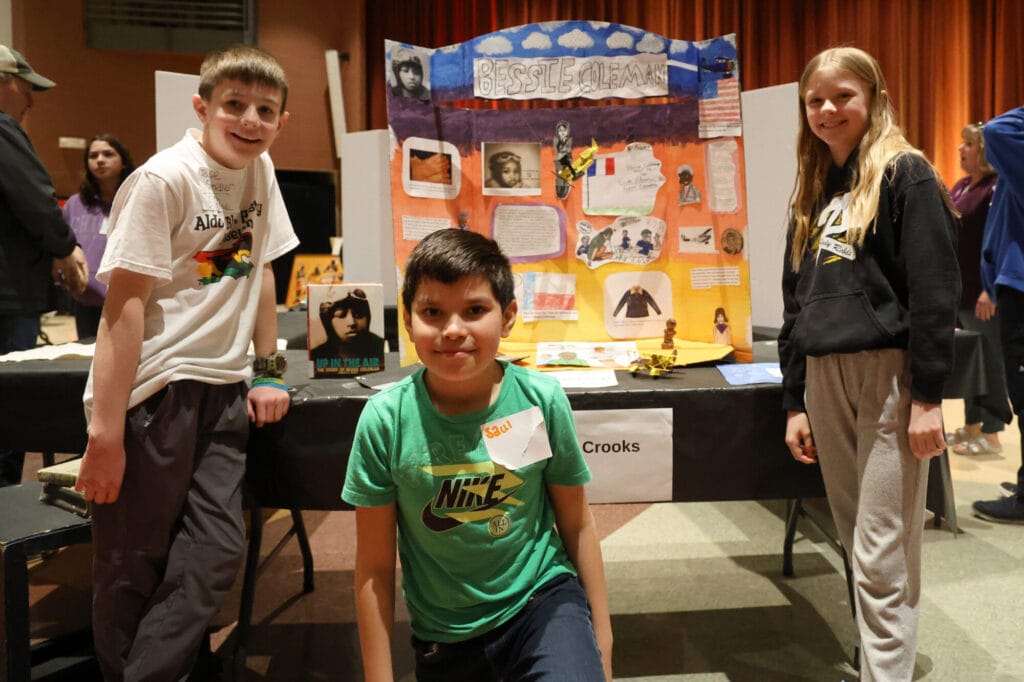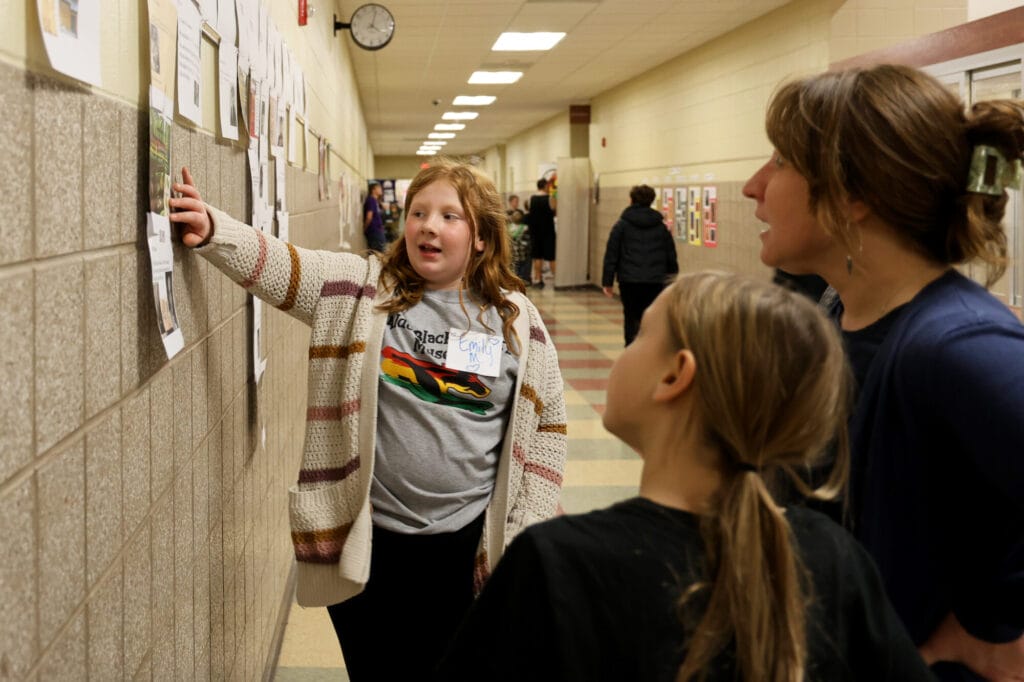In many ways, the exhibit overseen by Zyaire Baylark at Aldo Leopold Intermediate School’s fourth annual Black History Museum resembled those of classmates nearby.
It was well-organized and professionally presented, offering compelling information about its subject. But while neighboring displays showcased vivid portraits, drawings and photographs of Black American trailblazers, the only likeness of the subject of Baylark’s carefully crafted exhibit was a silhouette.
“There were no pictures of her,” Baylark explained.
The “her” he was referring to was Muscatine native Susan Clark, who in 1968 became the first Black student in the U.S. to desegregate a school by court order. The case went on to become instrumental in the Brown v. Board of Education case that ultimately ended school segregation nationwide.
At the age of 11, after her neighborhood school closed, Clark and her two siblings tried to attend a white school. After just two days, the school board issued a ruling that Black children couldn’t attend Muscatine schools. Two years later, Clark tried again to enroll in the school but was again turned away. This time, her father sued on her behalf. The case made its way to the Iowa Supreme Court, where a ruling was made in her favor. Clark went on to graduate from that school — with honors. Today, a Muscatine school is named after her.
“She made white people and Black people go to the same school, and that’s how we are today,” Baylark said. “If Black people and white people couldn’t go to the same school, things would be really different. I probably wouldn’t be here right now.”

Through their exhibits, the fifth- and sixth-graders told the histories of Black resilience, triumph, and innovation.
“Bessie Coleman was the first African American female aviator to get her pilot’s license,” fifth-grader Saul Rodriguez said. “She got rejected by every school in the United States and she went to France to get her pilot’s license.”
The students spent the weeks leading up to the annual event researching their subject, compiling that research into digestible snippets to be displayed in their exhibit, and finding and creating artifacts such as drawings, dioramas and sculptures.
“The process of making this was long and a lot of hard work,” fifth-grader Adelayne Diewold said as she pointed out a blueprint of an airplane that her classmate had drawn and a model airplane made of popsicle sticks and cardboard. There was also a QR code to a song about Coleman that she and her classmates created using an AI program.
QR codes were featured in other exhibits as well, especially those about musicians such as Louis Armstrong. Amid quotes from the famed trumpet player and vocalist and his pictures, a collection of QR codes took visitors to his music.
“I’ve heard a few of his songs, but this project kind of changed more of how I see him,” fifth-grader Journey Carr said.
As Carr talked to visitors about Louis Armstrong and her class’s exhibit, her father, Demond Carr looked on proudly.
“I’m just very proud of her,” he said. “She does great in all her projects and I just had to come see what type of display she did. She does a great job. She kind of kept it a secret from me, just telling me I need to come and see it.”
Demond Carr said the Black History Museum is a good way for children to learn about Black history.
“I think it’s great,” he said. “It’s good to see that schools are still having Black History Month and having the kids get involved with stuff like this.”
Former principal Tim Cradic and instructional coach Melissa Nelson-Chiprez first started the Black History Museum was started in 2021 to
encourage student-led projects that would foster learning while involving the Burlington community. It’s been a hit every year since.
“This is one of my favorite events at Aldo Leopold,” Aldo Principal Sara Watkins said. “I’m just happy to carry on the tradition that Melissa Nelson-Chiprez and Tim Cradic started. I love that we get to showcase so many different things from our students and from our student athletes.”
As she spoke, those student athletes were vying for the Man Club Basketball Championship title, a new feature of the Black History Museum. Man Club is an intervention group for various groups of students led by Antonio Redd, a student success advocate. Sports Club is a sub group of that club, and those involved began their basketball tournament about a month prior. The top two teams competed in the gym.
“To be able to showcase these young men tonight is fun,” Watkins said, explaining that the championship added another student-driven component to the evening. “I think (the Black History Museum) is an important opportunity for our students to showcase all the things they can do. The museum is 100% student-led, from their research, to their projects to their artwork, and I think it’s just a great reflection for our students and for this community.”

The importance of learning and celebrating Black history was not lost on students.
“I think people need to remember that Blacks had to fight really hard to get their equality and that we shouldn’t repeat history,” fifth-grader John Rockwell said.
The significance of Black History Month is evident at other buildings as well, from student artwork displayed in the hallways to songs sung in music class to classroom projects.
At the elementary levels, lessons were taught about equity and prominent figures in Black history through books, writing exercises, music and discussion, and students learned about famed painter Alma Thomas by studying her paintings before creating their own in her style.
At Edward Stone Middle School, for example, projects ranged from presentations on Black American scientists to the construction of safe rooms modeled after those along the Underground Railroad. In Social Studies, students learned about Africa and Apartheid, Black American soldiers in the Revolutionary War. And in math, students learned about famous and lesser known Black mathematicians.
At Burlington High School, Minority Scholars kicked off the month of February with a Black History Month assembly, and Leo Club members volunteered their time at Aldo’s Black History Museum, where they took note of the same figures being represented as they’d been learning about in their history classes.
“We have been studying peace-makers of Black history,” BHS teacher Cherie Talbott said of her class. “We finished Sojourner Truth and are moving on to a new peace-maker this week. We have examined how we ourselves can be a peacemaker and different occupations that fit that role.”

